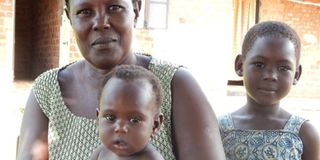Taboo on sex talk exposes older women to health risks

Ms Atim, a resident of Ngora Town with her grandchildren. Older women also need sexual health education. Photo by Richard Otim.
What you need to know:
The subject of sexuality among older women remains largely taboo, yet they are sexually active and vulnerable to infections, writes Richard Otim.
For over three hours, Mary Adeke, a 47-year-old widow had endured the labour pangs, wriggling with no relief.
She was rushed to a traditional birth attendant to help her with a local remedy as she had no money to hire a motorcycle to take her to the nearest health facility. She had developed a fatal complication.
Shortly after the death of Adeke’s husband, a young man aged 22 years had come in to live with the widow and before anyone realised there was something brewing between the two, they were a couple.
A mother of ten, Adeke had apparently defied the menopause age barriers and soon conceived her tenth child, the one that would eventually kill her.
“She had been advised not to conceive because of her age but because her new man insisted he wanted a child from her, she risked and died,” one of Adeke’s cousins says.
At the health centre where Adeke had been going for antenatal care she had been cautioned that the pregnancy she was carrying was likely to be a complicated one and she needed to visit a hospital with a gynaecologist at the earliest labour pains.
“She was rushed to us (at the sub-county health centre) from the birth attendant in a worrying condition and I had no option but to refer her immediately to Ngora Freda Carr Hospital. We could not handle her situation,” a midwife at Kobwin Health Centre II recalls.
Age-related pregnancy risks
“Women nearing menopause in most cases do not have normal deliveries. For those who come to us during antenatal visits, we normally advise them to undertake sexual reproductive health education to be able to understand the risks,” says Sr Esther Amoding, a midwife at Omiito Health Center II in Kapir Sub County, Ngora District.
According to Dr Francis Ogwang, a senior gynaecologist at Soroti Regional Hospital, older women are at higher risk of developing pregnancy complications and it is advisable they seek regular counselling to be able to decide whether to conceive or not.
He said some of the medical risks associated with conceiving at an advanced age include general maternal health problems such as increased chances of having a baby with a congenital abnormality, stillbirth, prolonged labour and need for assisted delivery or caesarean section.
“Aging in women also affects chances of conceiving because as a mother grows older, the number of egg cells produced by the ovaries declines,” Dr Ogwang explains.
He adds at older age, the quality of men’s sperms too declines, increasing the risk of genetic defects compared to younger men. This is also something that younger women should consider before conceiving in a cross-generational affair.
Women who conceive over the age of 40 years are more likely to have babies with conditions such as Down’s Syndrome which is a chromosomal abnormality that normally results into congenital heart defects.
Older women less empowered
The Uganda Demographic and health Survey of 2011 highlights that while contraceptive use increases with women’s empowerment, only 38 per cent of married women in Uganda participate in decisions concerning their personal health.
Former Atutur hospital medical superintendent, Dr Alfred Okiria says a woman’s ability to control her fertility and the methods of contraception she uses is likely to be affected by her extent of empowerment.
An elder with Iteso Cultural Union, Frances Akello says the subject of sexuality in older people in Teso remains largely taboo and yet older women too are known to have sexual desires.
“Many older women feel sexual reproductive health (talk) is not something for them to indulge in according to the social norms. Such aging stereotypes are not good for safety of older mothers who may still be sexually active, especially widows,” says Akello.
The World Health Organisation (WHO) in a 2012 perspective on “sexual health in older women” indicates that older women are not only at greater risk of exposure to serious sex-related complications but physiologically more vulnerable to these infections. Postmenopausal changes to the lining of the vagina can reduce innate protective mechanisms against infection.
Due to changing disease patterns, older people may also be at increased risk of engaging in unsafe sexual behaviours and of being exposed to and exposing others to the risk of sexually transmitted infections.




